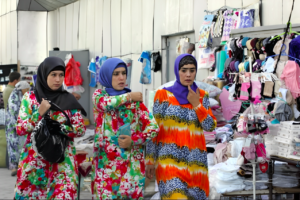The Iranian Red Crescent Society (IRCS) has announced readiness to enhance ties with the Red Crescent societies of Libya and Tajikistan.
The Libyan Red Crescent Society’s president, Abdel Salam Mohammad Gheith, in a meeting with the head of the IRCS, Pir-Hossein Kolivand, in Tehran on Monday, asked Iran to share its managerial and practical experiences with Libya, IRNA reported.
“We want to acquire comprehensive and practical management techniques and gain operational experiences from the Iranian Red Crescent Society,” Gheith said.
Saying that Libya would like to follow IRCS’s extensive and diverse activities, he went on to ask the IRCS to open a hospital in Libya in order to benefit from Iran’s medical services.
Kolivand, for his part, stated that the IRCS is willing to share its experiences in various fields including textile and pharmaceutical products, herbal medicines, artificial organs, training specialized teams, and rescue groups.
He went on to say that the IRCS is ready to cooperate with the Libyan Red Crescent Society and set up a clinic or hospital there, as it has already established 14 medical centers in countries such as the United Arab Emirates, Tajikistan, Afghanistan, Ivory Coast, and Kenya.
Meanwhile, the secretaries general of the Red Crescent Societies of Iran and Tajikistan in a meeting discussed ways to enhance collaboration.
During a meeting held between Yaqoub Soleimani and Bahodur Kurboniyon Bobojon, the officials highlighted cooperation on training young volunteers and the establishment of a medical facility in Dushanbe.
Soleimani said the IRCS is ready to transfer knowledge and experiences in the fields of relief and education to Tajikistan by signing a memorandum of understanding.
Intl. Humanitarian Conference to help Gaza
On January 21, in an address to the International Humanitarian Conference to Support Palestine which was held in Tehran, Kolivand suggested setting up a joint fund with other countries to provide aid to people in Gaza.
Referring to the crimes committed by the Zionists in the Gaza Strip in the last one hundred days, he stated that the activities of the international organizations have become ineffective due to the barriers made by the Zionist regime. “If we fail to do something to help, history will judge us,” IRNA reported.
Appreciating South Africa for suing Israel to the International Court of Justice, he added, “We will also declare a war crime against the Zionist regime.”
Killing civilians, attacking hospitals, and targeting medical staff are part of Israel’s war crimes.
Exploring possible avenues to provide humanitarian aid, using humanitarian diplomacy to stop the war permanently, creating a joint financial fund, and declaring crimes against the Zionist regime were among the axes of the conference.
During the conference, the vice president of the International Federation of Red Cross and Red Crescent Societies, Manuel Bessler, for his part said aid groups and relief organizations should be coordinated and united to help Gaza.
Elaborating on Israel’s crimes, Bessler stressed the need for a ceasefire.
Delivering humanitarian aid to Gaza needs to be increased. The International Federation of Red Cross and Red Crescent Societies as global actors focus on three main issues: providing vital assistance to civilians, saving their lives, and safety based on international laws.
Women, children and the elderly are looking for safe places, and the frontline actors providing aid to Gaza must fulfill their duty in this regard, he added.
Bressel went on to say that, relief organizations in Gaza are in difficult and dire situations; Gaza needs more humanitarian aid. The shortage of fuel and lack of ambulances have made it much more difficult to provide aid in Gaza.
Stressing the importance of finding an immediate response to the situation in Gaza, he said this is not a political issue, but political solutions can be used to address the problems.
ICRC, IRCS co-op
In September 2023, The International Committee of the Red Cross (ICRC) and the Iranian Red Crescent Society (IRCS) welcomed signing a five-year memorandum of understanding in order to give a boost to bilateral ties.
Within the framework of ICRC duties, the memorandum could be greatly helpful in better responses to crises, ISNA quoted Robert Mardini, ICRC director general, as saying.
“IRCS and the ICRC can play a complementary role in many fields,” he added.
He made the remarks in a meeting in Geneva on September 13 with Soleimani.
All activities relating to the principles of the International Red Cross, international humanitarian rights, and its promotion are the basis of this cooperation, Mardini noted.
Referring to the IRCS as a reliable partner in West Asia, the ICRC official emphasized: “Our cooperation and partnership with IRCS is very important and valuable because of its vast and extensive knowledge and experience in dealing with immigrants, refugees, and victims of war.”
Soleimani, for his part, welcomed the signing of the five-year memorandum of understanding and considered it to be a roadmap for more cooperation and interaction between the Iranian Red Crescent Society and the International Committee of the Red Cross.
He stressed IRCS’s capabilities and capacities to serve the immigrants including over five million Afghan immigrants who have access to necessary facilities in education and health.
He pointed out, “Despite the problems caused by sanctions, IRCS has made great efforts to promote immigrants’ well-being.”
Iran is IFRC’s strongest member in region
In July 2023, Hossam Elsharkawi, the International Federation of Red Cross and Red Crescent Societies (IFRC) Regional Director for the Middle East and North Africa (MENA), referred to Iran as the strongest member in the region.
“Among the 192 national Red Crescent and Red Cross societies around the world, the Red Crescent of the Islamic Republic of Iran has always been one of the most important and strongest societies and a reliable member of the Federation.”
Elsharkawi made the remarks in an online meeting with Razieh Alishvand, the Iranian Red Crescent Society’s director for international affairs, Mehr reported.
The quick and effective presence of the Iranian Red Crescent Society in the rescue operations and then providing relief to earthquake victims in Turkey and Syria last winter shows the good preparedness of the IRCS in response to natural disasters, the IFRC official highlighted.
In February, IFRC appreciated the Iranian Red Crescent Society for its services during the recent devastating earthquake in Turkey and Syria.
“I praise the leadership and commitment of the Iranian Red Crescent Society,” IFRC President, Francesco Rocca, wrote in a letter to IRCS Head Pir-Hossein Kolivand.
“I assure you that the International Federation of Red Cross and Red Crescent Societies stands by your side in carrying out humanitarian missions,” Rocca added, IRNA reported.
“Words cannot express my gratitude to the volunteers and staff of the Red Crescent Society of the Islamic Republic of Iran, who worked tirelessly to save people’s lives and support the needy from the very beginning of the emergency.”
“Undoubtedly, your efforts are all the more meaningful when you consider the humanitarian response that the Iranian Red Crescent Society is making nationally in the Khoi region and in several provinces affected by climate problems,” the IFRC president highlighted.
Source: Tehran Times











